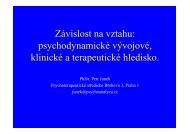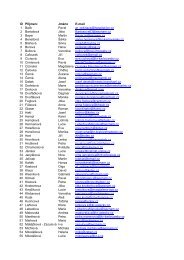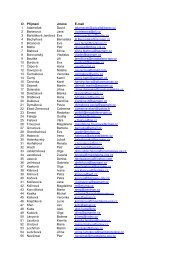Bonding Therapy (BP) and trauma
Bonding Therapy (BP) and trauma
Bonding Therapy (BP) and trauma
Create successful ePaper yourself
Turn your PDF publications into a flip-book with our unique Google optimized e-Paper software.
<strong>Bonding</strong> <strong>Therapy</strong> (<strong>BP</strong>) <strong>and</strong> <strong>trauma</strong><br />
dr. Bogdan Polajner, psychologist<br />
<strong>Bonding</strong> psychotherapy fellow<br />
Work shop presentation<br />
VI. Conference about <strong>trauma</strong> <strong>and</strong> drug addiction<br />
Czechia, October, 2009<br />
.<br />
1
Abstract<br />
• <strong>BP</strong> in a group orieneted psychotherapy for persons with basic<br />
emotion disorders. It was founded by USA psychiatrist Dan Casriel<br />
<strong>and</strong> later developed by orher therapists. <strong>BP</strong> is in use in USA, EU,<br />
South America etc. There is World association of bonding<br />
psychotherapist, simmilar European association (ES<strong>BP</strong>) etc.<br />
• <strong>BP</strong> is well used in high treshold programms for drug addicts, expc.<br />
into TC's. <strong>BP</strong> can improve therapeutic work with patients in general;<br />
also can be used for making general therapeutic work deeper <strong>and</strong><br />
shorter.<br />
• From individual view, patients can with <strong>BP</strong> work on basic emotions<br />
problems, as well as on relation's <strong>and</strong> cognitive shema's.<br />
Key Words:<br />
• <strong>Bonding</strong> psychotherapy, basic emotions, drug addicts<br />
2
Content of presentation:<br />
• Short introduction of <strong>BP</strong><br />
• Relations beetween <strong>BP</strong>, <strong>trauma</strong> <strong>and</strong> TC<br />
• Slovene experience with <strong>BP</strong> groups<br />
3
About <strong>BP</strong> – short introduction:<br />
• “<strong>BP</strong> is a group therapeutic process for the<br />
treatment od disorders that are connected to<br />
a lack of fulfillment of the neurobiologically<br />
anchored psychosocial basic needs” (short<br />
definition; Stauss, 2005)<br />
• … for change through corrective emotional<br />
experiences<br />
• …not only for the reduction of symptoms, but<br />
also for increase joy <strong>and</strong> satisfaction in life<br />
4
Relations beetween <strong>BP</strong>, TC <strong>and</strong><br />
<strong>trauma</strong>:<br />
• <strong>BP</strong> has roots also in early TC movement (1960, Dan Casriel, Synanon, USA)<br />
• <strong>BP</strong> <strong>and</strong> TC are in service for high <strong>trauma</strong>tised persons (drug addicts,…).<br />
• <strong>BP</strong> <strong>and</strong> TC deals with the same typical emotional, personal, behavioral <strong>and</strong> family<br />
caracteristics of the clients <strong>and</strong> their <strong>trauma</strong>tic experiences:<br />
- early experiences with painfull rejections<br />
- feeling of “not exist”<br />
- intensive fear of rejection<br />
- lack of possibility to ask for help<br />
- lack of fullfiling of basic needs (expc. need for love)<br />
- basic untrust (<strong>and</strong> because of it high manipulative behavior)<br />
- basic emotional disorders<br />
- low contact with body sensations<br />
- relationship <strong>and</strong> atachment style disorders,<br />
- other basic “negative attitudes”, etc.<br />
5
Why to use <strong>BP</strong> into TC at all?<br />
• <strong>BP</strong> can create a significant + influence to TC’s<br />
clients through next general ways of help:<br />
- increasing th. process in general;<br />
- deepening of individual th. processes (TC can<br />
work with deep <strong>trauma</strong>s of clients <strong>and</strong> not<br />
just with behavior <strong>and</strong> outside symptoms);<br />
- shotrening of individual th. processes;<br />
6
Typical steps of <strong>BP</strong> (1-day) group<br />
session<br />
• (before: intake interviev, selection of clients, therapeutical<br />
plane, introduction seminar, starting feed-back,…)<br />
• Basic exercises for contact with basic emotions <strong>and</strong> body<br />
sensations (8.00-9.30)<br />
• <strong>Bonding</strong> exercises (mat work or other forms of “bonding”<br />
exp. for clients witch feels in clasical bonding to much<br />
closennes with others <strong>and</strong> to high tension) (10.00-11.30)<br />
• Attitude work in the circle (13.00-15.30)<br />
• Exercises for: pleasure, feeling of connection / belonging to<br />
the group, relaxsation, love (towards self <strong>and</strong> to others)<br />
(16.00 – 16.45)<br />
• Final feed back <strong>and</strong> individual plans for transfer <strong>BP</strong> work to<br />
everyday life (into TC, to home,…) (17.00-18.00)<br />
7
Typical steps of <strong>BP</strong> group session<br />
Emotional<br />
“worming up”<br />
eksercises<br />
<strong>Bonding</strong><br />
(mat work)<br />
Attitude work<br />
(in the circle)<br />
8
Basic emotions<br />
• Fear<br />
• Anger<br />
• Emotional pain (sorrow, sadness,…)<br />
• Pleasure<br />
• (short phase of emotional emptiness – time to<br />
decision or threath to stay trapped into pain)<br />
• Love<br />
9
Typical emotion dynamic through <strong>BP</strong><br />
fear<br />
anger<br />
Emot. pain<br />
Emot.<br />
emptiness<br />
Pleasure <strong>and</strong><br />
love<br />
“no<br />
emotions”<br />
10
Basic emotions through therapeutic<br />
phases*, related to TC<br />
(* if everything going well)<br />
Deep emotions are blocated (by using<br />
drugs etc), mechanisms of defence are<br />
high<br />
Fear<br />
Anger<br />
Emotional pain, sorrow, sadness,…<br />
Emotional pleasure, peace, love <strong>and</strong><br />
feeling “I’m OK / others are OK”<br />
Early Reeciving phase (before TC)<br />
late Reeciving phase, before <strong>and</strong> on<br />
begining of detox phase (before TC)<br />
Detox phase, early residential TC phase<br />
Middle of residentinal TC phase<br />
Late residentional TC phase<br />
Reentry phase (after TC)<br />
11
Basic positive attitudes<br />
The most basic attitudes:<br />
• I exsist<br />
• I need<br />
• I have the rihgt<br />
• I am lovable<br />
Other basic attitudes:<br />
• I’m worthy / I worth / I’m your equal<br />
• I’m not perfect, but I’m good enough<br />
• Me first<br />
• I’m responsabile (for my life,…)<br />
• I can choose<br />
• etc.<br />
12
1. basic positive attitude: “I exist”<br />
• Because <strong>trauma</strong>tic experiences drug addicts often feels:<br />
- I do not exist,<br />
- I do not have the right to be alive,…<br />
• Often two oposite ways of behavior if those negative<br />
att.:<br />
- too quiet, peacefool behavior, like he/she do not exist<br />
- violence, destructive, ackting-out behavioral,…<br />
• Charasteristics of those families: ab<strong>and</strong>onment or<br />
neglection towards child, devorced or addicted parents<br />
(parents are not able to take care for their kids)<br />
13
2. basic positive attitude: “I need”<br />
• Because <strong>trauma</strong>tic experiences drug addicts often<br />
feels:<br />
- I do not have needs<br />
- I may not ask for help<br />
- I should do everything on my own (me alone)<br />
• To much pain in early years to fullfeel the needs <strong>and</strong><br />
because of this low connection with own needs<br />
• Philosophy of those parents: “Who does everything<br />
alone, is worthy for three others”<br />
14
3. basic positive attitude:<br />
“I have the right”<br />
• Because <strong>trauma</strong>tic experiences drug addicts often<br />
feels:<br />
- I do not have the right<br />
- I may not dem<strong>and</strong> nothing for myselve<br />
- I do not deserve something good for me (I do not<br />
deserve a good life, a good future,…)<br />
• Families of those drug addicts often have low social<br />
perspective <strong>and</strong> low quality of life (often there is<br />
alcool problem already for generations in those<br />
families, etc.)<br />
15
4. basic positive attitude: “I’m lovable”<br />
• Because <strong>trauma</strong>tic experiences drug addicts often<br />
feels:<br />
- I must deserve love<br />
• Negative attitude is often connected with high sense<br />
of guilt<br />
• Families of those drug addicts often shows to<br />
children that they are lovable only if they behave<br />
good (they are not lovable because of them selves)<br />
• Too strict rooles are significant for those families<br />
16
Others basic positive attitudes:<br />
“I’m worthy / I’m your equal”<br />
• Because <strong>trauma</strong>tic experiences drug addicts often<br />
feels:<br />
- I’m not equal to others / I worth less than others<br />
• Those drug addicts have negative experience with<br />
reeciving attention (like kids they got attention only<br />
if they were sick,…)<br />
• Families often too critisyze to kids (“you are not for<br />
any use; you are worthless in school, at home,…)<br />
• These negative attitude often shows brothers <strong>and</strong><br />
sisters of drug addicts<br />
17
Others basic positive attitudes:<br />
I’m not perfect, but I’m good enough”<br />
• Because <strong>trauma</strong>tic experiences drug addicts often<br />
feels:<br />
- I need to be perfect,<br />
- Only the best is good enought from me,…<br />
• Those families often use “hermetic close”<br />
invironment for kids<br />
• Those parents often expect too much from kids<br />
(from emotional, psychological <strong>and</strong> also from<br />
physical wiev: “You need to be beautifool”)<br />
18
Others basic positive attitudes:<br />
I’m responsable (for my life)”<br />
• Because <strong>trauma</strong>tic experiences drug addicts often<br />
feels:<br />
- I’m not responsable for my own life (others<br />
decides,…)<br />
• Those families usualy takes over all responsabilites<br />
<strong>and</strong> always decide or work instead the child<br />
• Those families do not aprove that child can takes<br />
his/her own decisions, risks, experiences <strong>and</strong><br />
learning process also through mistakes,...<br />
• Those parents blocate child’s personal growth<br />
through decision making <strong>and</strong> responsabilites 19
Others basic positive attitudes:<br />
“I can choose”<br />
• Because <strong>trauma</strong>tic experiences drug addicts often<br />
feels:<br />
- I do not choose / decide about I realy want<br />
- I must decide like my parents, partner,… want(s)<br />
• Those drug addicts feels like they are “predeterminate”<br />
for all future life<br />
• Those families often (simmilar to negative attitude<br />
“I’m not responsabile”) takes over all decisions,<br />
plans, choises,… from kids<br />
• Blocate process of separation <strong>and</strong> individualisation<br />
20
Others basic positive attitudes:<br />
“Me first”<br />
• Because <strong>trauma</strong>tic experiences drug addicts often<br />
feels:<br />
- I belong to the very last place (beetween others)<br />
- All others are better than me<br />
- Others do, think, speak, deserve,… better than me<br />
• Those drug addicts allways speaks last on the group<br />
or – without support - prefere do not speak at all<br />
• Those parents ussualy used phrases towards kids:<br />
“You are small – so be quiet; you are stupid – let to<br />
the adult to speak,…”<br />
21
Some old Slovenian experiences with<br />
<strong>BP</strong> weekend-group work<br />
• Old practise of <strong>BP</strong> in TC before 5-10 years ago: 2-3<br />
days of intensive <strong>BP</strong> work (<strong>BP</strong> weekend) / 4 x / year:<br />
- to intensive emotional experience for clients<br />
- to much stress for clients<br />
- often drop out <strong>and</strong> acting-out behavior after <strong>BP</strong><br />
session<br />
- for clients too rarely (4x / year) to be able to connect<br />
one <strong>BP</strong> experience with the next one<br />
22
Some present Slovenian experience<br />
with 1-day <strong>BP</strong> group work<br />
• 1-day <strong>BP</strong> group / every 2 month or more often:<br />
- almost no acting out behavioral; no drop-outs of<br />
programme,… after <strong>BP</strong> session<br />
- clients can do a transfer of their own <strong>BP</strong> progress<br />
into their every day life<br />
• still open: how to even more increase feeling of love<br />
(not to feel just pleasure, without love / like it is<br />
typical for addicts…)<br />
23
Thank you for your attention!<br />
.<br />
24





